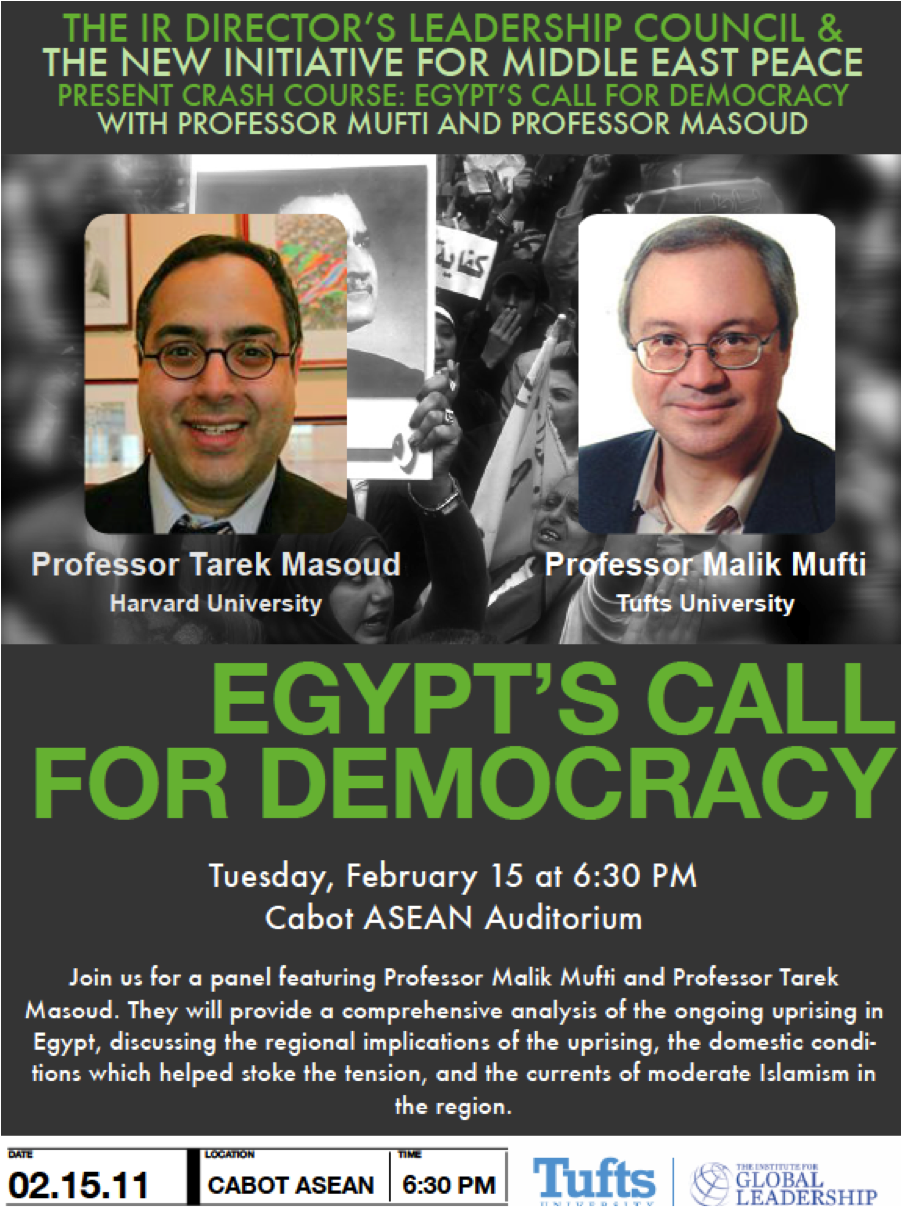Upcoming Public Forum on Egypt

|
|
On Tuesday February 15th, the New Initiative for Middle East Peace (NIMEP) will hold a public lecture/forum to discuss the current turmoil in Egypt, as well as short and long term implications for the country and the region as a whole.
The event will start at 6:30pm in Cabot Auditorium and is open to the public.
Two leading experts on Egypt and the Middle East, Professor Tarek Masoud of the Kennedy School of Government at Harvard University and Professor Malik Mufti of Tufts Univeristy, will speak at the event. They will provide a comprehensive analysis of the ongoing uprising in Egypt, discussing the regional implications of the uprising, the domestic conditions which helped stoke the tension, and the currents of moderate Islamism in the region.
NIMEP is a non-polemical student think-tank and outreach initiative under the aegis of the Institute for Global Leadership, aimed at finding progressive solutions to the historic conflicts in the Middle East. NIMEP provides a forum for productive dialogue, scholarship, and exploration of the region. This initiative is committed to contributing to future leadership and to inspiring others to realize the powerful results such a model of thinking and action can produce.
Tarek Masoud is an assistant professor of public policy at Harvard University's John F. Kennedy School of Government. A political scientist and Middle East specialist, his research focuses on political development in countries that are poor and unfree, uncovering the processes by which governments become more accountable to, representative of, and responsive to the needs of their people.Masoud is the co-editor of Problems and Methods in the Study of Politics(Cambridge, 2004) and Order, Conflict, and Violence (Cambridge, 2008), and his articles and reviews have appeared in the Journal of Democracy, Foreign Policy, and the International Journal of Middle East Studies, among others. In 2009, Masoud was named a Carnegie Scholar by the Carnegie Corporation of New York, and was awarded the American Political Science Association's Aaron Wildavsky Award for Best Dissertation in Religion and Politics. He is also the recipient of grants and fellowships from the National Science Foundation and the Paul and Daisy Soros Foundation. Masoud holds an AB with honors from Brown and received his Ph.D in political science with distinction from Yale in 2008.
Malik Mufti teaches courses on international relations as well as the politics of the Middle East. He received a Ph.D. and an M.A. from Harvard University, an M.A. from Yale University and a B.A. from Middlebury College. He is the author of Sovereign Creations: Pan-Arabism and Political Order in Syria and Iraq (1996), and Daring and Caution in Turkish Strategic Culture: Republic at Sea (2009). He has also written shorter pieces on the domestic politics, international relations, and political thought of the Near East, including his latest two journal articles "Jihad as Statecraft: Ibn Khaldun on the Conduct of War and Empire" (History of Political Thought, Autumn 2009), and "The Many-Colored Cloak: Evolving Conceptions of Democracy in Islamic Political Thought" (American Journal of Islamic Social Sciences, Spring 2010). His current projects include a study of Ibn Khaldun's concept of asabiyya, and a larger research project on realpolitik in Islamic political thought. He is a recipient of the Lillian and Joseph Leibner Award for Distinguished Teaching and Advising.

